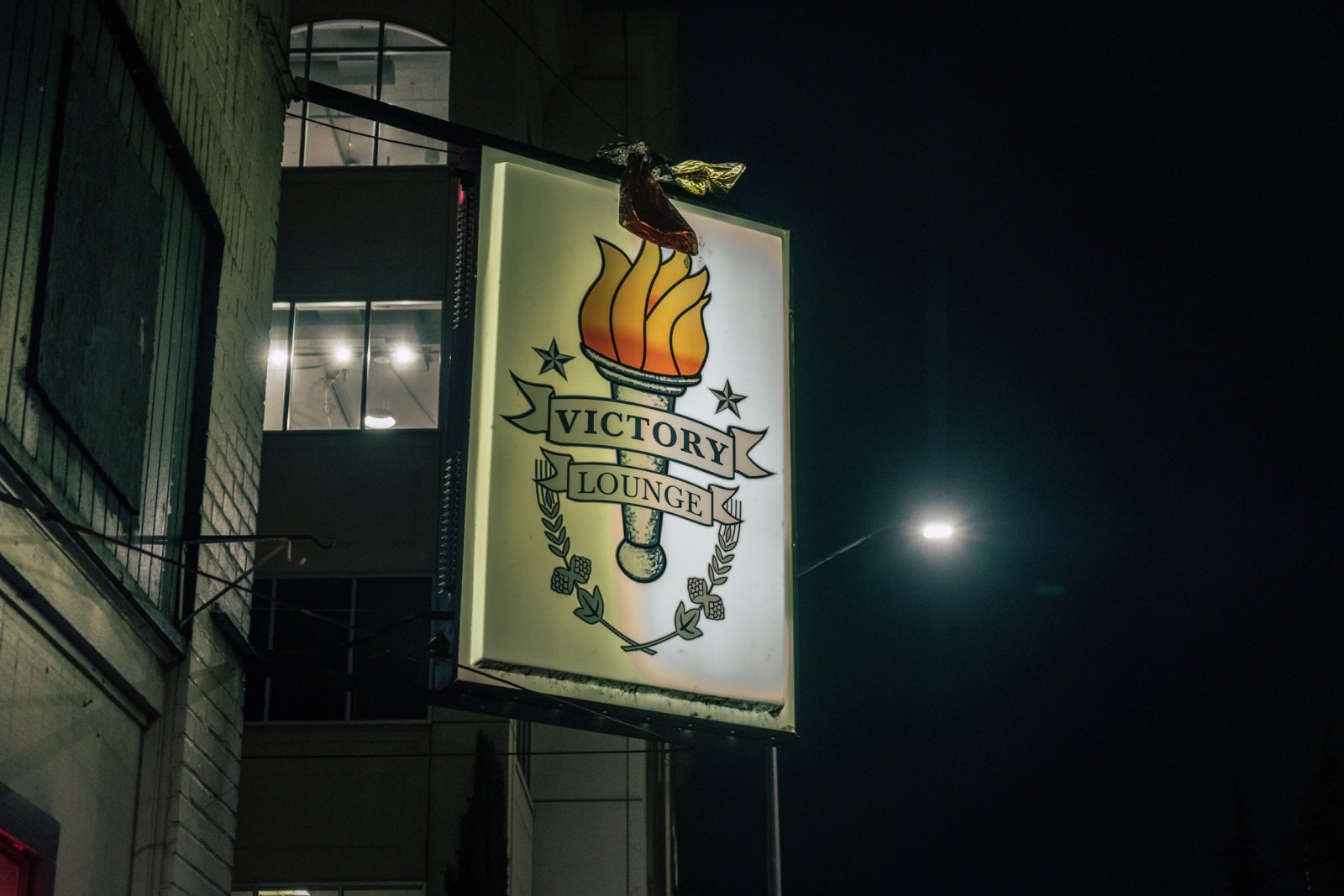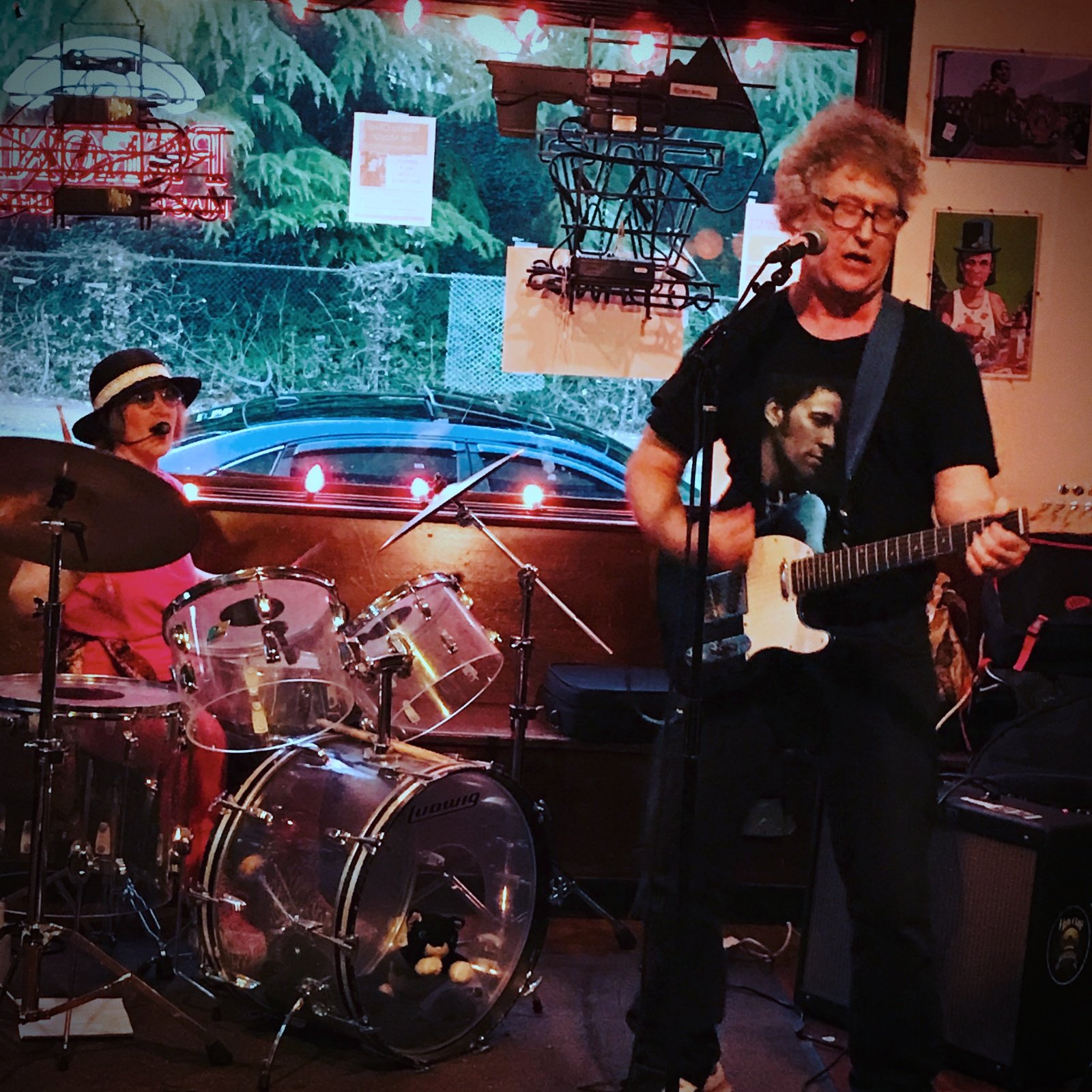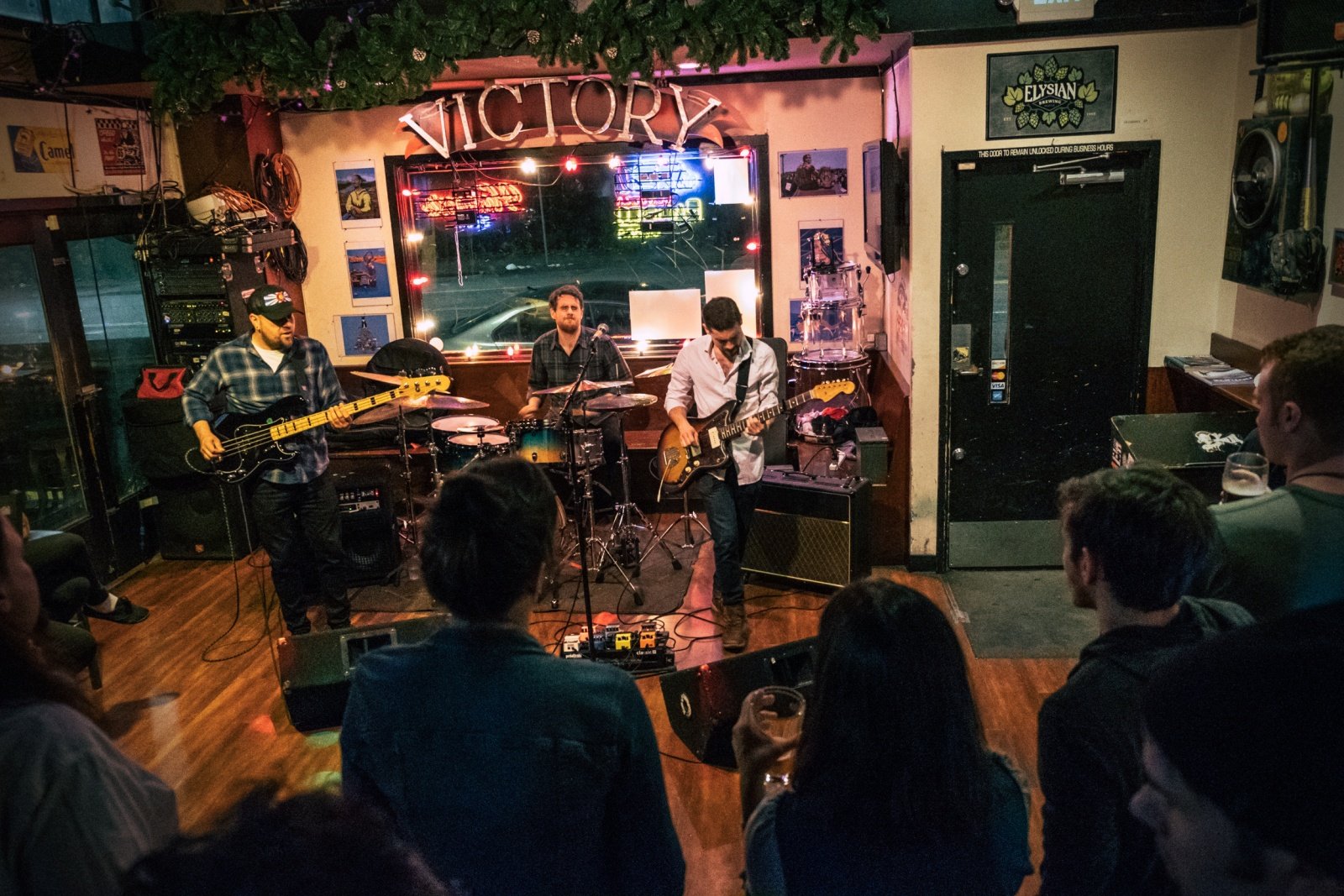An Elegy For The Victory Lounge
A moment of reflection on the end of a Seattle institution, and the community that will continue to thrive without it.
Photo by Chris Patterson.You would enter the door and everything would change.
Under your shoes, gray pavement would transition to scuffed, umber-colored hardwood warped by decades of feet in motion. Suddenly you would find yourself in a time capsule, a humble space and a far-cry from the “fast-casual architecture” of the surrounding buildings, those staunch cubes hastily summoned to the surface like cysts. Around you, walls would tower in macro stripes of brown, then white, then brown again like turkey on pumpernickel. A pair of blaring pinball machines and an ATM would watch over enervated bar patrons clutching drafts, their fingers greased by baskets of fried food. A dirty covered porch would hold asylum for the nicotine addicts, whittling days off their lives in exhales of smoke that converge to clog the air.
If you got there at the right time you’d be face to face with the crowd, a handful of its members pausing to appraise you before returning their collective attention toward the band, who would be mere inches from your right. They were so close that if you were a jerk you could fuck with them, shifting an amp with your foot or casually heckling a player within earshot, but who would try it? The band was the entire point; the space existed for their benefit. Nowhere else would feel warmer or more inviting than the space where they held court, pounding out original material in front of a giant window, the edges permanently adorned with giant Christmas bulbs and kitschy pine branches.
It’s to this spot that outside passersby could peer inside, the glass obfuscated by flickering neon signs and event posters, and be transported. The window was a wormhole to a time before Seattle morphed into a cold colony of coders and warehouse workers, before a culture of heartless productivity subsumed the simple joy of creative expression amplified in community.
A band called Fine. [October 2017]If you were a local musician in the last fifteen years, chances are you played the Victory Lounge at some point. The unassuming structure jutting out from the corner of Eastlake and Republican housed the spirits of its previous iterations over the last century, all of them fittingly facilitators of alcohol: the Green Tavern, Mister Ed’s Tavern, and especially the Lobo Inn and the punk ghosts that haunted the woodwork. Like the Substation and the Central Saloon and any other number of bookable event spaces, it was a necessary facet of Seattle’s underground music scene. To so many of us it was a sonic nursery, a low-stakes locale for inchoate talent to sow the seeds of their craft or push noncommittally at the boundaries of their ambitions.
It didn’t matter what kind of music you played or what kind of following you managed to scrape together. If you wanted a show, the Lounge did its best to have your back. That meant you’d find established acts - in my personal history, bands like Dead Bars and Monsterwatch - as often as you’d find newborn acts with members of all ages and backgrounds testing the waters to see if they could capture the attention of a sparse crowd of happenstance, to discover if they even wanted to. More than anybody else, it was to these people whom the space felt dedicated.
Over the last few years, I’ve borne witness to countless convergences of voices, my memory hindered by sweating cans of Rainiers and dimmed by nocturnal exhaustion. I recall grinning at the giddy clang of a pair of punks on the cusp of old age. I remember a coworker urging me to a Thursday show, where he led a trio of no-wavers thrillingly circumventing tonality at a brutal volume. I remember a emo band, then another emo band, then another one, convalescing into a cumulative torrent that chipped away at my defenses.
Not all of these acts were memorable. What mattered was that they were there, contributing to the discussion simply by filling the space with their bravery. Even in such a quaint arena it takes real courage to open yourself up to the judgment of strangers, to position aspirant perfection next to the mistakes of a rookie. And mistakes would inevitably happen, but they never really mattered; flubbed notes, snapped strings, bad loops, technology gone haywire or vocals marred by feedback, all evaporated into the air by virtue of their presupposition.
Instead all that would remain was the performance itself, a fruit borne from the ardor of weekly practices wedged into precarious schedules that clashed with life’s myriad obligations. Time, energy, love, passion, money, effort, all of this would coalesce into an act as selfish as it was selfless: flickering between strokes of the ego and desperate cries for connection, between raw-nerve vulnerability and the rapturous surge of warranted attention, faster than the human eye can detect. There’s a verity to these performances that make them as valuable, as emblematic of humanity, as anything. The “Victory” sign above the stage was simply the punctuation.
Your Mother Should Know. [July 2017]Because I was once a musician, I know this firsthand. In my last band I played two shows at the Victory Lounge, and the first, on a night in mid-July, was a catastrophe of my own making.
Here’s what I remember: I had invited a litany of people from my workplace for the occasion, and from this pool I managed to guilt a handful of regular customers and coworkers into making the trek to Eastlake. That night I took the stage intending to summon some higher power, some residual angst naturally dissipating from my brain chemistry in the progression through my twenties. Like so many other performers, I wanted people to feel what I was feeling, to move the way I was moving, conveying something greater than language itself.
But that intention clashed with my ineptitude. During a particularly climactic moment as I flailed around, caught in a cyclone between euphoria and exorcism, I stepped on my cord and wrenched the jack out of my guitar. Suddenly I was making no sound, and that silence lengthened as I frantically devised the problem between songs. Later, wracked by nerves, I started on the wrong tuning and stopped the song, but instead of considering a restart I simply carried on where we were, killing the momentum in a flash. The damage had been done; of everyone on the bill that night we were by far the worst act. An older gentleman who was there on my behalf approached me and attempted to soften the blow, but still openly decreed the show a disaster.
I felt crushed and embarrassed, feeling the weeks worth of anticipation bubble up in waves of frustration and shame, the hours of practice potentially wasted, my bandmates’ judgment unavoidable. Yet I had learned from the trial. As defeated as I was in the moment, later I realized there were adjustments I could make in its wake. The purchase of a coiled cord meant I could give myself room to thrash. I could devote myself to practicing tuning between songs until it became second nature. Most importantly, I had the memory of the moment to remind myself not to give in to pre-show anxiety. I could breathe easier in that awareness, knowing that even a worst-case scenario has its merits.
Sure enough, when we returned the next year, we fared much better. As we launched into our set the room felt electric, all pairs of eyes on our synchronicity, all ears on weird rhythms of our music. We finished that set like conquerors. Juxtaposed with the previous year’s failure I felt empowered by the payoff of my courage. The night progressed in a revelry of cheap-ish beers with friends old and new as I coasted on that high. Until I decide to play another show and experience that peculiar alchemy once again, that feeling will remain unmatched.
My old band, Arbor Towers. (Photo by Chris Patterson.)You see what I mean? Cities of Seattle’s scale require small venues where musicians who are just starting out can afford to fuck up. That is their inherent value. How much that value means in an era where music has largely moved online - where local bands share a stage with the largest (and, by extension, highest-funded) globally-known artists, and where rampant curation reinforces the corrosive presumption of perfection - is up for debate. That the Victory Lounge can no longer afford the lease on the space is a sad yet unsurprising reality of Seattle’s egregious rent situation, but the other (or at least “another“) side of the coin is the ever-decaying prospect of Seattleites patronizing a space hosting bands of largely unvetted skill.
There are those of us who deeply appreciate the rudimentary underground, who understand that the purpose of such spaces isn’t just the promise of entertainment but the community it facilitates for people who feel shunned from their own. But we are - and were, and will always remain - a fringe group compared to the people who would rather enjoy nights out in relative peace, in spaces that kowtow to their desires rather than those of its performers. As a consequence of the way the city has changed, Seattle attracts these types of people more than ever: people who favor the din of a sparkling boutique nightclub to a lived-in vessel for caterwauling noise bands.
These are the same people that praise, that even scaffold, the advent of technologies that have essentially eroded the old venue model. They have been trained like each and every one of us to treat all manner of creative mediums, homogeneously labeled “content,” as courses in an endless buffet on which they are led to gorge and fatten like swine. They treat art not as process but as product, allowing them to elide over the human dialogue that fuels it by making its creators faceless. They still need music, but in the face of their anxieties and their dread what they demand is a smooth pink paste, a placid passivity, an incessant search for salves and panaceas over something more akin to the sting of alcohol.
In a time when moods and vibes supersede wills and ideas, the raucous heartbeat of the city’s subterranean scene feels even more at odds with its home base. In the general sense, we’re into the idea of Seattle being a hub for our kind of music, but we hold our noses at the actuality of its contemporary existence.
Casper Skulls, from Ontario. [April 2018]There are multiple nuanced reasons why the closure of the Victory Lounge feels as inevitable as it does tragic. It reflects the havoc that capitalism eternally wreaks on artistic endeavors. It also represents the way Seattle has changed alongside the rest of America’s metropolitan hubs, each a facsimile of New York’s anonymous gentrified blueprint.
What it doesn’t represent, however, is the health of its scene. Far from postulated infirmity, Seattle’s underground continues to thrive, introducing new voices to penetrate your expectations and allowing older ones to hone their craft.
It might not be obvious, but that’s because it exists exactly as it always has: underneath the unsuspecting gaze of its inhabitants. Those of us that hold today’s Seattle-based bands up to the impossible standards of its forebears forget that the alternative explosion that propelled Nirvana into superstardom was a freak occurrence, a strike of a lightning bolt. It may have been a coincidence foreshadowed by over a decade of DIY networking and grassroots interest, but it was a coincidence nonetheless.
Before that moment, the renowned acts we still associate Seattle with - acts that many still insist epitomize us - were earning the same sparse yet tight-knit crowds you see today. Friends, acquaintances, members of the scene, and a few hapless passersby drawn inside by the clamor would make up the audience, and together they would celebrate the camaraderie just as much as the music. They’d crowd together and freak out and revel in the dynamic between performance and audience that continues to hold an elemental power, a power that existed just for them: just for its participants, just for the people who needed a space to be themselves amid crippling societal frameworks and all the -isms and -phobias of the time. That power is indelible, and those who dare to venture into those spaces will find it hasn’t gone anywhere.
Lately I’ve been ruminating on a Tweet by Zola Jesus wherein she claims that “no alternative to the mainstream is allowed to exist anymore.” I think she means that it’s impossible for any budding movement, like the one we saw in this city thirty years ago, to properly incubate before it’s exposed to fervent outside attention, ripping it from the womb before it’s fully developed. If art requires an audience, and the overwhelming majority of the audience is on the Internet, and the defining quality of the Internet is its readiness to provide information on everything, then how do you keep anything on it secret for long? The possibilities spiral: who knows how the “Windmill” scene of Brixton would have fared were the world not so ready to embrace it in its infancy? If a unique local band like Black Ends were given enough time to influence a new legion of imitators, would that fit the description of a scene that isn’t “broken”?
We have to remind ourselves, crucially, constantly, that music is not just a product. The curse of being a Seattle musician is to have to live up to the unreachable heights of an incongruous epoch, but a scene is not defined by its level of outreach or by any quantifiable number on a spreadsheet. A scene is undefinable. In fact, it refuses to be defined. It is made up of people you have never heard of (who, especially in a time of fast fame, would prefer it if you never heard of them) giving themselves away for the sake of their community. They graciously open their houses to shows, they draw from the well of their inner visions to create posters and merchandise, they promote releases through independent labels fueled entirely out-of-pocket, and they dutifully spread the word like flag bearers.
The music itself is beside the point. A scene wants nothing more than to embody the interconnectedness of its members, and that is a thread that won’t ever be severed as long as there are outcasts who want to perform and outcasts who want to listen. That makes it unquantifiable, and certainly at odds with gamification or the code-based algorithms that have swallowed the music industry, but that also endows it with a curious virtue that renders it wholly invaluable.
The last time I was at the Victory Lounge, Kay Redden was hosting Den Fest, a two-day event featuring a handful of acts she supported via her tape label. I missed Friday’s show but I was there Saturday, my bones aching from a demanding shift at the coffee shop. Once again I performed the ritual, opening the door to a blast of warm air, scanning the crowd for familiar faces, feeling that same sense of excitement and humiliation that seemed to pulse within the walls.
Perhaps it was the venue’s impending demise, or perhaps it was some collective sense of spite sparked by that particularly misguided Stranger article, but rarely have I seen the Lounge so packed. A piteous sign above the front door stated an occupancy of 49, a mandate that felt as flimsy as the printer paper on which it sat - we easily supplanted that number by a factor of two. Tons of recognizable faces filled the space along with an equal throng of new ones, and as the night progressed we struggled to pass each other on the way to the bar. As each act shuffled to the stage, you could spy patrons in the back standing on booths and chairs, stuffed together and drawn to the sound like moths to a streetlight.
In this context, live music rarely approaches such epiphanic heights. The highlights came fast and frantic. During Apples with Moya’s set, Cam LeFlam’s yelp carved peaks and valleys even though it had been hobbled by a cold. Soft Boiled, a phoenix risen from the ashes of Happy Times Sad Times, rollicked across the hardwood. Sam Parkin’s gorgeous folk rock held the crowd captive, his quavering voice carried by rivulets of guitar and bass to a final delta.
But most vividly I recall Sam Peterson’s solo acoustic act, Don Piano, who christened the evening in delicate arpeggios plucked on nylon strings. His music has always been beautiful, but that night the quietude of his songs harbored something else, something more solemn. I stood in the middle of the crowd, closed my eyes and listened as the sonorous rasp of his guitar, imbued with the warm crackle of an amp, merged with his tender baritone and floated overhead like campfire smoke. Then, to no one in particular, I let the tears come.
Don Piano. [November 2022]





